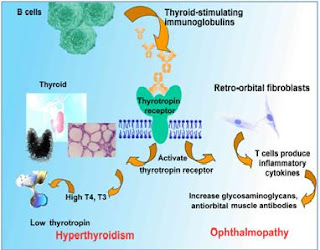Graves' disease is tiroktoksikosis form (hyperthyroidism) are most often encountered in daily practice. Can occur at any age, often found in women than in men. Signs and symptoms of Graves' disease is most easily recognized is the presence of goiter (diffuse hypertrophy and hyperplasia), thyrotoxicosis (thyroid gland hypersecretion / hyperthyroidism) and is often accompanied oftalmopati, and accompanied dermopati, though rarely.
Pathogenesis of Graves disease has so far not known with certainty. However, genetic and environmental factors thought to contribute to the mechanism that is not definite increased risk of suffering from Graves disease. Based on the characteristics of the disease, Graves' disease are grouped into autoimmune diseases, among others, with the discovery of antibodies to the TSH receptor (Thyrotropin Stimulating Hormone - Receptor Antibody / TSHR-Ab) with various levels.
The definition of cases being Basedow's disease (WWV difusa toksika) is the most frequent cause of tireotoksikoza is a disease that is usually characterized by a otonium a autoantitel, that have similar working TSH thyroid. Patients with Graves disease are typical symptoms of hyperthyroidism and special additional symptoms of increased thyroid gland/diffuse goitre, oftamopati (eksoftalmus/vypučennye eyes), and sometimes with dermopati.
The etiology of Disease Graves is one of the autoimmune diseases where the cause is known. This disease has a strong genetic predisposition, of which 15% of patients have a close family relationship with the same disease. About 50 per cent of families with the disease, Graves thyroid autoantitel was found in his blood. Disease discovered five times greater among women than among men, and can occur at any age. The high incidence in aged between 20 years to 40 years.
In the pathogenesis of Graves' disease, have stimulated T lymphocytes to antigens located within the thyroid gland which in turn will stimulate B lymphocytes to synthesize antibodies to these antigens. Synthesized antibodies that will react with the TSH receptor in thyroid cell membranes so that it will stimulate the growth and function of thyroid cells, known as the TSH-R antibodies. The presence of antibodies in the blood circulation has a close correlation with disease activity and relapse. Otoimunitas mechanism is an important factor in the pathogenesis of hyperthyroidism, oftalmopati, and dermopati in Graves' disease. Until now there are three major otoantigen known of the thyroid gland thyroglobulin (Tg), thyroidal peroxidase.
Pathogenesis of Graves disease has so far not known with certainty. However, genetic and environmental factors thought to contribute to the mechanism that is not definite increased risk of suffering from Graves disease. Based on the characteristics of the disease, Graves' disease are grouped into autoimmune diseases, among others, with the discovery of antibodies to the TSH receptor (Thyrotropin Stimulating Hormone - Receptor Antibody / TSHR-Ab) with various levels.
The definition of cases being Basedow's disease (WWV difusa toksika) is the most frequent cause of tireotoksikoza is a disease that is usually characterized by a otonium a autoantitel, that have similar working TSH thyroid. Patients with Graves disease are typical symptoms of hyperthyroidism and special additional symptoms of increased thyroid gland/diffuse goitre, oftamopati (eksoftalmus/vypučennye eyes), and sometimes with dermopati.
The etiology of Disease Graves is one of the autoimmune diseases where the cause is known. This disease has a strong genetic predisposition, of which 15% of patients have a close family relationship with the same disease. About 50 per cent of families with the disease, Graves thyroid autoantitel was found in his blood. Disease discovered five times greater among women than among men, and can occur at any age. The high incidence in aged between 20 years to 40 years.
In the pathogenesis of Graves' disease, have stimulated T lymphocytes to antigens located within the thyroid gland which in turn will stimulate B lymphocytes to synthesize antibodies to these antigens. Synthesized antibodies that will react with the TSH receptor in thyroid cell membranes so that it will stimulate the growth and function of thyroid cells, known as the TSH-R antibodies. The presence of antibodies in the blood circulation has a close correlation with disease activity and relapse. Otoimunitas mechanism is an important factor in the pathogenesis of hyperthyroidism, oftalmopati, and dermopati in Graves' disease. Until now there are three major otoantigen known of the thyroid gland thyroglobulin (Tg), thyroidal peroxidase.
 RSS Feed
RSS Feed Twitter
Twitter 13:06
13:06
 khalidadventure
khalidadventure

 Posted in
Posted in 



0 komentar:
Post a Comment